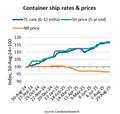BEYKOZ TANKERCILIK A.S.
- Ship Owners
BEYKOZ TANKERCILIK A.S. appears to be a Turkish company specializing in tanker shipping services. The company is involved in the maritime transportation of liquid bulk cargoes, which may include products like oil, chemicals, and other liquid goods.
Key aspects of BEYKOZ TANKERCILIK A.S. might include:
Industry Focus: As a tanker shipping company, their primary focus is on the safe and efficient transportation of liquid cargo. This requires adherence to stringent safety and environmental regulations to prevent spills and other accidents.
Fleet: The company likely operates a fleet of tankers. These ships vary in size and capacity, from smaller vessels for coastal and regional transport to larger tankers for international shipping.
Regulatory Compliance: Maritime transportation, especially of hazardous materials like oil and chemicals, is highly regulated. BEYKOZ TANKERCILIK A.S. would need to comply with international standards set by organizations such as the International Maritime Organization (IMO) and adhere to regulations like MARPOL (The International Convention for the Prevention of Pollution from Ships).
Market: The company serves various segments of the oil and chemical industries. Customers might include oil companies, chemical manufacturers, and other industrial entities requiring bulk liquid transport.
Technology and Safety: In the highly competitive and regulated tanker shipping industry, technology and safety are critical. The company likely invests in modern vessels equipped with the latest navigation and safety technology to ensure efficient and safe operations.
Environmental Considerations: There is increasing pressure on the shipping industry to reduce its environmental impact. BEYKOZ TANKERCILIK A.S. would need to adopt environmentally friendly practices and technologies, such as ballast water management systems, to minimize pollution and comply with environmental regulations.
As with any company operating in a niche and highly specialized industry, success factors include a strong focus on regulatory compliance, investment in technology, a commitment to safety, and excellence in customer service. It is also important for the company to stay updated with global maritime trends and innovations to maintain competitiveness.
Ships
CUMHURIYET
Tanker for Oil | Flag: Turkey | Port: ISTANBUL
Maritime News

Shipbuilding - JV Company Orders Containership Pair

Trump Administration Drops Gauntlet on UN Fuel Rules, Threatens Tariffs

Second-hand Containership Prices Soar in the Face of Soft Shipping Rates

“2 Days, 50 Ports”: New Wave Media Acquires Port of the Future Conference & Exhibition
